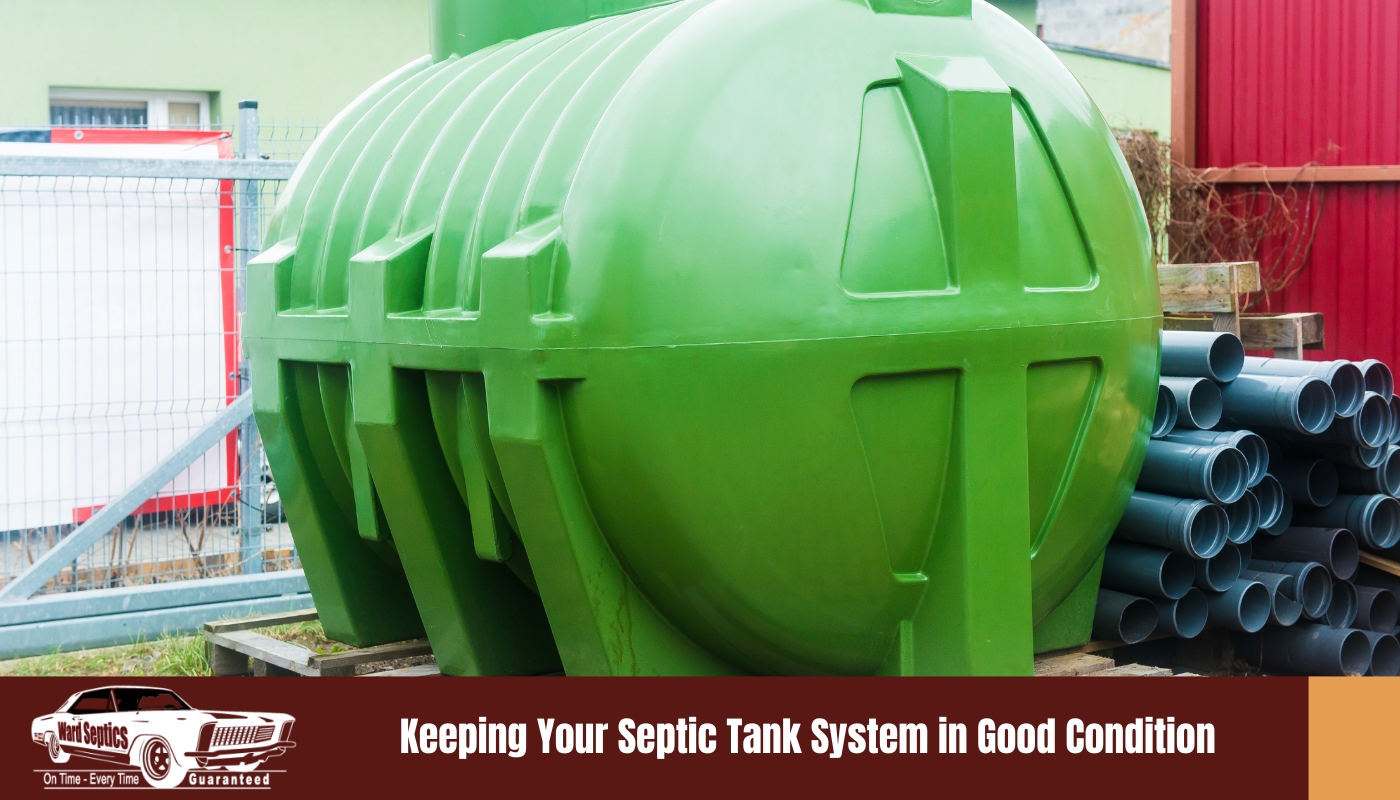Septic tank systems are commonly used in rural areas where centralised sewage treatment is not available. These systems are designed to treat and dispose of household wastewater on the property where it is generated. A septic tank is a watertight container made of concrete, fibreglass, or plastic that is buried in the ground. The tank is connected to the plumbing system of the house and receives all the wastewater from the household, including water from toilets, sinks, and showers.
In the tank, solid waste settles to the bottom, and the liquid waste flows out of the tank into a drain field, where it is further treated by soil and microorganisms. Proper maintenance of a septic system is crucial to avoid problems such as backups, odours, and system failure, which can be costly and hazardous to human health and the environment.
Common Septic Tank Problems
One of the most common issues is a clogged drain field, which can occur when the tank is not properly maintained, and solid waste accumulates in the field, blocking the flow of liquid. Another common problem is the build-up of sludge and scum in the septic tank, which can cause blockages, backups, and unpleasant odours. In addition, tree roots can penetrate and damage the pipes and tank, leading to leaks and system failure.
Environmental factors, such as heavy rainfall or flooding, can also affect the performance of a septic system, causing it to overflow or release untreated wastewater into the environment. It is essential to be aware of these common problems and take preventive measures to keep your septic system in good working condition.

Regular Septic Tank Maintenance
Regular septic tank maintenance is crucial to ensure the proper functioning of the system and avoid costly repairs or replacement. The frequency of maintenance depends on several factors, such as the size of the tank, the number of occupants in the house, and the volume of wastewater generated. Generally, it is recommended to have the tank pumped every three to five years by a professional septic service provider. Regular pumping removes the accumulated solids and scum from the tank, preventing blockages and backups.
Homeowners should avoid flushing non-biodegradable materials, such as wipes, feminine hygiene products, and cooking oils, as they can clog the pipes and cause damage to the system. It is also important to use water-efficient fixtures, such as low-flow toilets and showerheads, to reduce the volume of wastewater generated. Regular septic tank maintenance can help prolong the life of the system and ensure its safe and efficient operation.
How to Use Your Septic System Properly
Using your septic system properly is essential to maintain its efficiency and prevent problems. One of the most important things to remember is to only flush biodegradable materials down the toilet, such as toilet paper and human waste. Avoid flushing non-biodegradable items, such as plastics, wipes, and chemicals, as they can damage the system and contaminate the environment. It is also important to conserve water and avoid overloading the system. Fix leaks promptly, repair dripping faucets, and use water-efficient appliances and fixtures.
Be mindful of the products you use in your household, such as detergents, soaps, and cleaners, as some can harm the bacterial balance in the septic tank and reduce its effectiveness. Lastly, do not park or drive heavy vehicles over the drain field, as it can compact the soil and damage the pipes.

Environmental Factors Affecting Septic Tanks
Environmental factors can have a significant impact on the performance of septic tanks. Heavy rainfall or flooding can saturate the soil and overload the drain field, causing the system to fail. In addition, soil conditions, such as clay or rocky soil, can affect the absorption of wastewater, leading to backups and odours. Trees and shrubs planted near the septic tank or drain field can also cause problems, as their roots can penetrate and damage the pipes, leading to leaks and system failure.
Other environmental factors, such as temperature and pH levels, can also affect the bacterial balance in the septic tank and reduce its effectiveness. To minimise the impact of environmental factors, homeowners should avoid building structures or planting trees and shrubs near the septic system, ensure proper drainage around the property, and monitor the system during periods of heavy rainfall or extreme weather conditions.
Signs of Septic Tank Problems
One of the most obvious signs is a foul odour coming from the drains or the drain field. This could indicate a build-up of solid waste or a clogged drain field. Slow-draining sinks, showers, and toilets could also be a sign of a problem. In addition, gurgling sounds from the plumbing system, particularly after flushing the toilet, can indicate a blockage in the pipes.
Wet spots or pooling water around the septic tank or drain field, as well as lush vegetation or an unusual patch of grass, can also indicate a leak or a problem with the system. Finally, if sewage is backing up into the house, this is a serious sign of a problem that requires immediate attention.

DIY Septic Tank Maintenance Tips
While it is always recommended to hire a professional septic service provider for regular maintenance and pumping, there are some DIY septic tank maintenance tips that homeowners can follow to help keep their systems in good working condition. One of the simplest things to do is to conserve water and avoid overloading the system. This means fixing leaks promptly, repairing dripping faucets, and using water-efficient appliances and fixtures.
Adding bacteria to the septic system can also help improve its performance, as bacteria help break down waste and maintain the balance of the tank. Many commercially available products can be added to the system, such as bacterial additives, enzymes, or natural remedies like vinegar and baking soda. It is important to use only products that are specifically designed for septic systems and to follow the instructions carefully. You should also be aware of the location of their septic tank and drain field and avoid parking or driving heavy vehicles over them, as this can cause damage to the pipes and the soil.
When to Call a Professional
While there are some DIY septic tank maintenance tips that homeowners can follow, it is important to know when to call a professional septic service provider. If there are signs of septic tank problems, such as foul odours, slow drains, gurgling sounds, wet spots or pooling water, or sewage backing up into the house, homeowners should call a professional immediately. Attempting to fix a septic system problem on your own can be dangerous, as exposure to raw sewage can be hazardous to your health.
Without proper equipment and training, it is easy to cause further damage to the system. A professional septic service provider has the expertise and equipment to diagnose and repair septic tank problems safely and effectively. Regular maintenance, such as pumping the tank every three to five years, should also be performed by a professional to ensure the proper functioning of the system and prevent costly repairs or replacement. You should also call a professional if they are unsure about the location of their septic tank or if they suspect damage to the system.

Keeping Your Septic Tank System in Good Condition
Septic tank systems are an essential part of rural properties and require regular maintenance to operate effectively. By following proper use and maintenance techniques, homeowners can prolong the life of their septic system and prevent costly repairs or replacements. Homeowners should be aware of the signs of septic tank problems and call a professional if they suspect an issue.
Regular septic tank maintenance, such as pumping and inspecting the system every three to five years, is crucial to ensure the proper functioning of the system. With the right care and attention, homeowners can keep their septic tank system in good condition, protect their health and the environment, and enjoy their rural property for years to come.
Don’t wait until it’s too late – schedule your septic service today!
If you’re a homeowner with a septic system on your rural property, it’s essential to schedule regular maintenance to avoid costly repairs and replacements. At Ward Septic, we specialise in septic tank pumping, inspections, and repairs, and we have years of experience serving customers in your area.
Don’t wait until it’s too late – contact us today to schedule your septic service and ensure the proper functioning of your system. Our team of trained professionals will work with you to develop a customised maintenance plan that fits your needs and budget, so you can enjoy your rural property worry-free. Call us now to schedule your appointment and experience the difference with Ward Septic!








